They were tearful, they were angry, they demanded action and an end to the epidemic of death killing our youngest. It was commendable and cathartic that Donald Trump brought together those suffering from the Parkland shooting to listen to their pleas.
But then came the reveal. When the president began to speak, it became evident that the people who had come up from Florida were props at a staged event for 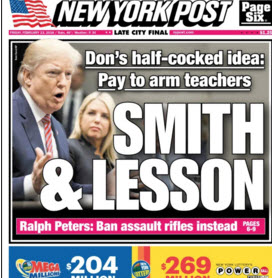
Trump to deliver his predetermined solution to school shootings. It is a solution right out of the playbook of the National Rifle Association — payback for the $30 million the NRA spent on Trump’s campaign. The solution? More guns. We should arm the teachers.
“It’s called concealed carry, and it only works where you have people very adept at using firearms…” he began, and would continue in the following days with…
“We have to harden our schools, not soften them up. A gun-free zone to a killer …that’s like going in for the ice cream, that’s like here I am, take me. But I think we need hardened sites. We need to let people know, you come into our schools, you’re gonna be dead”.
No thought is given to the opposite: banning civilian ownership of battlefield weapons designed only for killing the maximum number of people. Trump is so completely owned by the NRA that he was repeating what its executive vice-president, Wayne LaPierre, had said just hours earlier at the annual conservative CPAC convention:
“We drop our kids off at schools that are so-called gun-free zones that are wide open targets for any crazy madman bent on evil. They all must come together to implement the very best strategy to harden their schools including effective, trained armed security”.
As LaPierre has rather famously stated, “The only thing that stops a bad guy with a gun is a good guy with a gun”. Trump believes he would be that guy.
“You know I really believe, you don’t know until you’re tested, but I think I, I really believe I’d run in to.., even if I didn’t have a weapon.”
Trump was the first sitting U.S. president since Reagan to go to the NRA’s annual convention last April where he told them, “You came through for me and I am going to come through for you”.
scenario
Apart from the ugly picture of fortified schools and educators carrying guns on their hip; apart from what that tells our youth about how miserably our society has failed by its obsessive insistence that virtually anyone should be allowed to own a gun; apart from that, how would Trump’s ill-considered gift to the NRA work out?
For him, it would go like this:
“If the coach had a firearm in his locker when he ran at this guy,… he wouldn’t have had to run. He would have shot, and that would have been the end of it.”
That would have been the end of it. It would have been that easy. And the same story at every other school shooting, in Trump’s imaginings. “If you had a teacher who was adept at firearms they could very well end the attack very quickly.”
So the coach, with only a handgun, but expertly aimed as it would have to be, would have taken down the kid who was wearing body armor and a reinforced helmet and spraying bullets from his semi-automatic AR-15 assault rifle. The coach would have to be lucky enough to come from behind the shooter unseen, or when the shooter was changing magazines. Those are the stiff odds we will be asking our teachers and coaches to face under the Trump plan. Or are they, too, to have AR-15s in their lockers?
A teacher would also hope to be alone with the shooter in a classroom or hallway so that when he or she — 76% of teacher are women — fires his or her handgun, there is no turmoil of students and other teachers running from the shooter that could be hit. But we’re forgetting that Trump said, “it only works where you have people very adept at using firearms, of which you have many”. He imagines that schools are filled with ex-military.
“You’d have a lot of people that would be armed, they would be ready. They’re professionals, they may be Marines that left the Marines, left the army, left the air force and they’re very adept at doing that.”
But at least that admits that not just any teacher could handle the job of being the secret campus cop with the concealed-carry handgun ready to go against the assault weapon. They would need training. Assume that the volunteer teacher gets the same training as the local police officer. That’s not much. The fact is that most bullets fired by police miss their target. (It took over 100 rounds fired by police to kill Dzhokhar Tsarnaev in the Watertown, Mass., shootout after the Boston Marathon bombing.) So where would the teachers go not to just learn how to hit a stationary paper target at a firing range, but the kind of special ops training needed to confront with only a handgun someone on the move firing an AR-15, if such training exists? And all of this assumes that the teachers in our schools — men and women alike — have the kind of cool resolve that will filter out the chaos of a gun battle and overcome the fear of death, carefully aim a gun, and squeeze off a round or two.
unfunded mandate
Are the teachers and coaches to contribute the time and personal travel expense of the training? “What I’d recommend doing is the people who do carry, we give them a bonus. We give them a little bit of a bonus”, says Trump. That should make them step up. But who is “we”? Who pays for the specialized training and the little bit of a bonus? Not Donald Trump and the Republicans in Congress. The president’s own budget cuts money for school security. His bold plan leaves all the costs to the local school districts. Nor will the federal government pay a penny for the wrongful death suits when a coach’s or a teacher’s stray bullet kills a student or another teacher. Will those coaches and teachers volunteer when they realize that they will need insurance to cover the liability risk? Will insurers even write such policies? Just take note of the millions of dollars a year that local governments pay out for bad shoots by trained police officers.
army size
“So let’s say you had 20% of your teaching force, because that’s pretty much the number”, was Trump’s proposal for how many teachers should be armed in his concealed carry plan. There are 3.6 million teachers in the U.S., so his 20% means that 720,000 teachers in America would go to school every day wearing guns. Suicidal crazies with AR-15s bent on Armageddon are “not going to walk into a school if 20% of the teachers have guns”, he thinks. And to demonstrate how carefully he has thought out his plan he added, “or 10%, or maybe 40%”.
But now you see why the NRA is delirious about armed schools — three-quarters of a million gun sales served up to their clients, the gun manufacturers that support the association.
That’s more than seven guns on average for each of the country’s 98,000 schools. At Parkland’s Marjory Stoneman Douglas — a big high school — 28 coaches and teachers would have been carrying guns that day to meet the 20% quota. Amid the gunfire and rush of running students and teachers in the hallways, each would have the added risk of misidentifying and shooting each other. And then the SWAT team arrives. How many of the 28 gun-toting teachers and coaches — or the 8 in the average school — would they mistake for the shooter?
the public be damned
In a CNN town hall shortly after the shooting, Florida Republican Senator Marco Rubio, who has taken $3,600,000 in backing from the NRA, was fending off suggested restrictions on assault rifles: “It’s not the loopholes, it’s the problem that, once you start looking at how easy it is to get around [them], you would literally have to ban every semi-automatic rifle…”. That unintended slip was interrupted by sustained, screaming applause. It showed what the public truly wants.
Feb 25 2018 | Posted in
Policy |
Read More »
<|91|11|>
Donald Trump @realDonaldTrump

Contributions from the NRA: Approx: $30,000,000
Sen. Marco Rubio @MarcoRubio
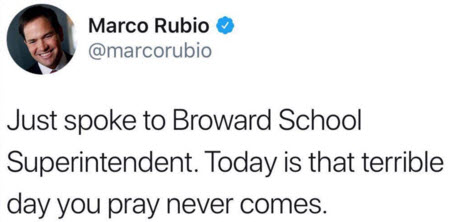
Contributions from the NRA: $3,300,000
Sen. John McCain @senjohnmccain

Contributions from the NRA: $7,700,000
Sen. Joni Ernst @senjoniernst

Contributions from the NRA: $3,100,000
Sen. Cory Gardner @sencorygardner

Contributions from the NRA: $3,900,000
Sen. Rob Portman @senrobportman

Contributions from the NRA: $3,000,000
Sen. Todd Young @sentoddyoung

Contributions from the NRA: $3,000,000
Vice President Mike Pence @VP

NRA Institute for Legislative Action rating: A
On the next page several of Marco Rubio’s thoughts and prayers…
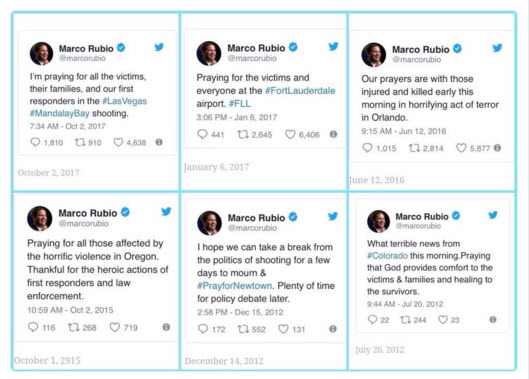
Feb 19 2018 | Posted in
Policy |
Read More »
For the last seven presidencies, the day began with reading the daily intelligence briefing, the product of an arduous nightly undertaking by the intelligence agencies that pulls together for morning delivery findings from all over the world.Kushner Clearance Downgraded: Feb. 28: His contacts with certain foreign government officials have raised concerns causing access to classified information to be reduced from top-secret to secret, still extraordinary for someone well past the time limit for temporary clearance.
But The Washington Post was told by three sources that President Trump can’t be bothered. He won’t read it. A selection has to be read to him, when he has the patience for even that.
That same edition of the Post tells us that Jared Kushner gets to read the President’s Daily Brief, or PDF, despite his not have a security clearance. Because background checks can drag on, and Kushner’s is complicated by his business dealings, he has been acting for all this time on a temporary status that allows him to see the most secret and sensitive information even while he is a subject of interest in the ongoing investigation into Russia’s involvement in the U.S. election.
So how’s that for paradox? Candidate Trump led the crowds shouting “Lock her up!” (what did he just say about due process?) for Hillary Clinton’s negligent security risk of exposing her email, yet now in the White House he has given a son-in-law without security clearance full access to national secrets.
During the campaign he had vilified Hillary Clinton for “extreme carelessness with classified material” and assured his audiences in August before the election that, “In my administration I’m going to enforce all laws concerning the protection of classified information” and in that September, “We also need the best protection of classified information”.
As for the president’s disinterest in the threats that confront the United States daily, we can’t say we weren’t warned. A month after the election, Trump bridled at the expectation he would do what presidents before him had done, telling Fox News’ Chris Wallace…
“You know, I’m like a smart person. I don’t have to be told the same thing in the same words every single day for the next eight years — it could be eight years. … I don’t need that. … But I do say: If something should change, let us know.”
(In that
same interview he ridiculed the notion that the Kremlin intervened in the election on his behalf).
In May came reports from a few who had conducted briefs about ways they had devised to overcome what they said is the president’s short attention span. “He likes single-page memos and visual aids like maps, charts, graphs, and photos”. Trump told Axios shortly before taking office, “I like bullets or I like as little as possible. I don’t need, you know, 200-page reports on something that can be handled on a page”. National Security Council officials said that their method is to insert Trump’s name in “as many paragraphs as we can because he keeps reading if he’s mentioned.” Reports on Russia are confined to the written briefs where he won’t run across them; they’re omitted from the oral recitations so as not to irritate the president, said this report from December.
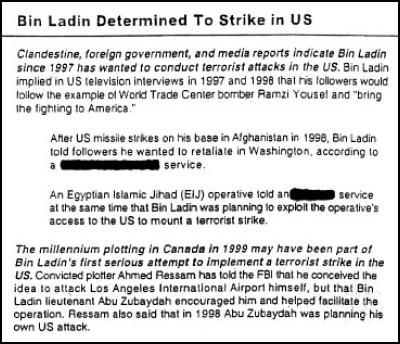
The most famous PDB: Delivered by hand by a CIA agent to George W. Bush, vacationing at his Texas ranch, it warned of bin Laden’s intention to attack the U.S. The president said to the agent, “OK, you’ve covered your ass”, and resumed cutting brush. That was on August 5, 2001; the attack occurred a month later.
During the transition the administration offered Trump the same briefings as President Obama but the president-elect declined. As an inveterate television watcher, he said he gets his information from “the shows”.
Some involved in security and intelligence matters were quick to speak up for the president. Michael Anton, a spokesman for the National Security Council, said Trump “is an avid consumer of intelligence, appreciates the hard work of his briefers and of the entire intelligence community and looks forward every day to the give and take of his intelligence briefings.”
Daniel Coats, the director of national intelligence, said in a statement that “any notion that President Trump is not fully engaged in the PDB or does not read the briefing materials is pure fiction and is clearly not based on firsthand knowledge of the process”. But he would then say in a Senate Intelligence Committee hearing about those allowed to work in the White House for months without security clearance, “The process is broken. It needs to be reformed”.
Early on the president received the daily brief with several others present which led to free-wheeling discussions that tended to crowd out those who had come to report on their issues of expertise. But then Chief of Staff John Kelly limited the number of attendees to make the briefs more focused. That may be why the president, according to his published schedules, has backed off verbal intelligence briefs to every two to three days on average. Trump has rarely, if ever, requested that the printed version be left behind to read, say those involved in the sessions.
Feb 18 2018 | Posted in
Governance |
Read More »
Jeff Bezos, Bill Gates, and Warren Buffet, America’s three richest people, have as much wealth as the entire bottom half of the U.S. population — some 162 million people — according to the Institute for Policy Studies, says The Guardian.
Feb 14 2018 | Posted in
Items |
Read More »

Before she moved to D.C., Melania Trump went back and forth from New York to D.C. until son Barron finished the school year. Over the three-month period, she took 21 trips on air force jets, at a cost to us of $675,000, says The Wall Street Journal.
Feb 14 2018 | Posted in
Items |
Read More »
There are about 2 million people employed by the federal government so it may not seem all that important that a comparatively small number of posts sit empty. But these are the jobs of key personnel, some 1200 top jobs that call for presidential nomination and Senate confirmation. Of those The Washington Post 
tracks 630 that are thought to be the most important. More than a year into the Trump presidency, 240 of those positions didn’t even have a nominee by early February. Another 140 have been nominated but await confirmation. There was a change in the law a year ago, meant to give an incoming administration time to find people to fill slots, that allowed temporary acting replacements to step in — but only for 300 days. That limit has lapsed, leaving swaths of the government without the office holders authorized to make decisions for their agencies and departments.
“We don’t need all the people that they want. You know, don’t forget, I’m a businessperson. I tell my people, when you don’t need to fill slots, don’t fill them”
That is what the president has to say. In business that’s true of the lower echelons of workers, but not those who are there to lead their organizations.
There is no one in the top job at the National Highway Transportation Safety Administration nor anyone to head its legal, financial or enforcement divisions. At the Agriculture Department the office overseeing national food safely is empty. So are top slots at the Pentagon. No one has been nominated to run the National Park Service, the Social Security Administration, nor the Bureau of Alcohol, Tobacco, Firearms and Explosives (ATF). The president wants to ramp up nuclear weapons capability but several key nuclear oversight jobs are unfilled at the Energy Department which oversees both nuclear power and weapons. The president — in his state of the union address and earlier — has spoken of overcoming the opioid crisis, but there is no director even inside the White House at its Drug Control Office. No director of the White House Office of Science and Technology policy to serve as the adviser to the president, either. And soon to become most worrisome of all: with 2020 looming, there’s no one in the top two spots at the Census Bureau, on whose work a decade of elections will depend.
At the agencies, as we reported a while back, Scott Pruitt wants to cut the Environmental Protection Agency by 21%. Secretary of State Rex Tillerson is slashing his department by almost a third. The president has yet to fill half a dozen ambassadorships in the Middle East, including to the major powers Egypt, Saudi Arabia and Turkey. With the looming threat of North Korea, and now the Winter Olympics in full swing, there isn’t even an ambassador to South Korea, a lack of on-scene guidance that perhaps explains the vice president’s ill-advised snubs while attending the opening ceremonies.
As for those working at lower levels of the government, many have left. About 700 had left the EPA by the end of last year. Nearly all members of the National Park Service’s advisory panel resigned in frustration. Interior Secretary Ryan Zinke had “refused to meet with them or convene a single meeting last year”, said The Washington Post. Overall, the Trump administration saw a 34% departure rate during his first year — the highest turnover in 40 years.
The Post is not singling out the Trump administration exceptionally for scorn. They keep track at this site where, as can be seen in this table, they have kept score for four other presidents: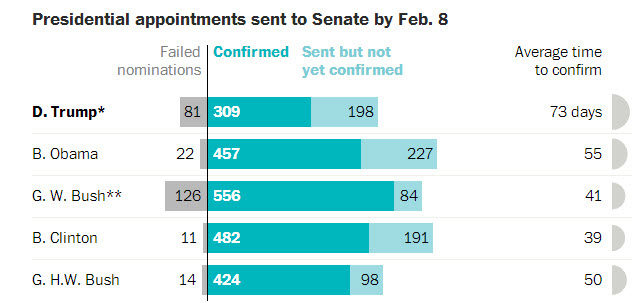
Feb 14 2018 | Posted in
Governance |
Read More »
“High-paying jobs. Good jobs. Not the jobs we have today which everybody agrees are bad jobs”. The president made a theatrical show of saving 1,100 jobs (which proved to be more like 800) at a Carrier plant in Indiana from moving to Mexico during his first days in office, but that appears to be that, it seems. Over the past year 93,000 jobs moved offshore, with nary a protest from the White House, the highest number in five years, according to the U.S. Department of Labor.
Feb 14 2018 | Posted in
Items |
Read More »
Citizens of Tennessee can no longer carry signs into the state legislature. Signs protesting Medicaid expansion, immigration, etc. are often home-made, fastened to sticks, and “represent too great a safety hazard”. But citizens can freely carry guns into the chamber.
Feb 14 2018 | Posted in
Items |
Read More »
Chief of Staff Gen. John Kelly had told us, “This president has said from the beginning, I want everything out…I want the American people to know the truth”. White House Press Secretary Sarah Huckabee-Sanders then told us “the administration will follow the same process and procedure” with the Democratic rebuttal to the controversial memo by Republican chairman of the House Intelligence Committee Devin Nunes.
Alas, neither statement was true. Instead President Trump blocked release of the Democrats’ attempt to fill in what FBI Director Christopher Wray said, referring to the Nunes opus, were “material omissions of fact that fundamentally impact the memo’s accuracy”.
The Nunes memo sought to expose the FBI, and in turn the special counsel, as biased and corrupt. Democrats on the committee are infuriated at what is irrfutably an attempt to create distrust in whatever charges their investigations bring. Instead of releasing what the Democrats intend to be a take down of the Republican memo, White House counsel Donald McGahn has told the Democrats they will have to work out with the Justice Department what can be seen by the public, alleging that portions of their counter-memo “would create especially significant concerns for the national security and law enforcement interests”, if disclosed. Democrats on the House Intelligence Committee, led by California’s Adam Schiff, suspect that Justice will redact with a heavy hand parts which are not classified but which undermine the White House campaign, with readers none the wiser for not knowing what’s behind the heavy black crossouts. As well, they expect deliberate delaying of the release until well after other newsbreaks — the Rob Porter imbroglio already proves the point — have displaced the memo saga in the public’s attention.
failings
Nunes evidently believed he had found the smoking gun against the FBI in a filing for a FISA surveillance warrant in which “material and relevant information was omitted”. Authorities must apply to the FISA court — set up by the Foreign 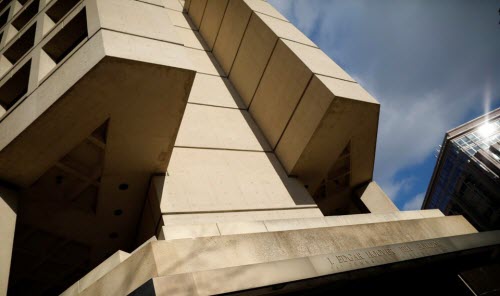
The FBI building in Washington, D.C.Intelligence Surveillance Act of 1978, the identity of its judges and its proceedings secret — to obtain clearance to spy on a U.S. citizen, in this case former Trump campaign associate Carter Page.
The memo says the application failed to disclose that the document referred to as the “dossier”, compiled by former British MI6 agent Christopher Steele, was the product of “opposition research” aimed at Trump and paid for by the Clinton campaign. (There was no mention in the memo that Republicans opposed to Trump had first funded Steele’s research).
The Nunes memo in turn fails to mention that, to demonstrate probable cause, FISA applications are voluminous, relying on considerably more than a single document and believed to run to 50 to 100 pages typically. As James Comey put it when FBI director, they were often thicker than his wrists. Other than the mention that the dossier is an “essential part” of the application, the memo pretty much leaves the reader thinking the dossier was pretty much it.
That comports with the pre-memo Republican attempt to make what they always call the “unverified” dossier the trigger that set off the Russian probe. To successfully persuade us it was the genesis would make the Russian investigation a politically driven contrivance whose conclusions should be ignored.
The memo then cites now-former FBI Deputy Director Andrew McCabe testifying to the committee in December that “no surveillance warrant would have been sought…without the Steele dossier information”. Does that mean the FBI had too little else to rely on, or that the dossier was of course included as something that shouldn’t be left out? Or neither. Two sources have told The Daily Beast that McCabe said no such thing.
show cause
If the Nunes memo started out as an attempt to prove that the dossier triggered the FBI probe, that was recently undercut by the discovery that another Trump associate, George Papadopoulos, in London in May 2016 during an evening of “heavy drinking”,
let slip to Australia’s top diplomat to the UK that Moscow had thousands of emails that would embarrass Hillary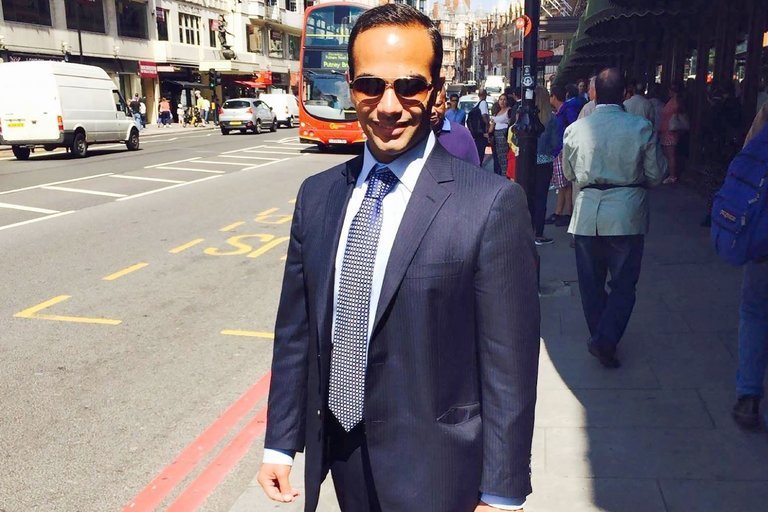
Former Trump campaign aide George Papadopoulos on a street in London.
He has pleaded guilty to lying to the FBI about his Kremlin-related contacts.
Clinton. The diplomat notified the FBI and their investigation was underway months before Christopher Steele came upon information in his explorations that caused him, too, to notify the FBI. The Nunes memo makes grudging admission that this was the true signal that launched the FBI investigation, but immediately points out that the inquest was begun by Pete Strzok, the FBI agent subsequently demoted for exchanging anti-Trump emails with his mistress.
sin of omission
The first submission to the FISA court was on October 21, 2016, a fortnight before the election. Some members of Congress may have learned of it by then, but it didn’t reach the media until December. (These pages covered it before most did.) So it would have been unlikely for FISA court members to have known of the dossier and a material omission not to have spelled out its provenance — at least that is the reasonable claim of the memo. Committee Democrats claim that the memo is incomplete, inaccurate and misleading.
FISA warrants expire after 90 days. Renewal requires a “separate finding of probable cause” each time, as the memo recognizes. If the provenance of the dossier — that its research was paid for by the DNC and the Clinton campaign — was not known by the FISA court judges at the time of the first application, it certainly would have been known by them at the time of each of the renewals which spaned a year. It was all over the media. The memo sweeps in all the renewals as if they are as guilty as the original’s sin, yet the judges evidently didn’t object. The court kept giving the go ahead.
The memo lists a number of people beginning with FBI Director James Comey who signed off on a total of four submissions. The most recent of these was by Deputy Attorney General Rod Rosenstein. The president said about the memo after he cleared it:
“I think it’s terrible, you want to know,…I think it’s a disgrace what’s happening in our country and when you look at that and see that and so many other things what’s going on then a lot of people should be ashamed of themselves and much worse than that.”
A reporter then asked the president whether he was more likely to fire Rosenstein, whether he had confidence in him. Trump replied, “You figure that one out”. Here’s our calculus:
Attorney General Jeff Sessions recusing himself from the Russia inquiry — he was compromised for having himself met with Russians — has never ceased to infuriate the president. He had put Sessions at the head of the Justice Department to protect him.
In March he fumed “Where’s my Roy Cohn”, referring to the viperous sidekick lawyer at Senator Joe McCarthy’s side whom Trump later engaged as his own counsel.
The recusal put Rosenstein in charge of Robert Mueller and his investigation, the only one with the power to constrict the investigation or fire the special counsel. Trump had highly inappropriately asked Rosenstein if he was “on my team”, to which the probably flustered deputy lamely answered, “we’re all on your team” (when he should have answered that the Justice Department is on no one’s team).
But, once again, as with Comey and others, the lack of a one-to-one personal loyalty pledge puts Rosenstein in Trump’s crosshairs. The president makes it obvious that he is searching for a pretext to fire the DAG so as to replace him with someone more malleable, someone who will go as far as firing Mueller. Now Trump can point to the memo as giving him that pretext: After all, wasn’t Rosenstein party to what the memo claims is a fraudulent surveillance warrant? He has set extreme Republicans to howling that Rosenstein must get the axe.
person of interest
There was ample reason for surveillance of Carter Page. He had appeared on the FBI’s radar in 2013 when he showed up in wiretaps as being courted by a pair of Russian spies and a Russian banker in New York. He was on suspiciously good terms with Russia which led the FBI to wonder if he had become a Russian agent. In 1998 he had worked for Ian Bremer’s Eurasia Group but his vehemently pro-Kremlin views made him not a good fit. He was even outspokenly against Obama and Clinton, which may have been what made him attractive to Trump. The campaign approved a trip to Moscow in 2016. The Steele dossier reported that he was straightaway accorded secret meetings at the Kremlin with top Russian officials, one being the second most powerful among them and a former KGB agent. “Collusion”, a recent book by Guardian reporter Luke Harding says Page was offered a deal worth millions if he could get the Trump administration to reverse Obama’ sanctions against Russia. Harding’s stunning profile of the curious Mr. Page is online at Politico. If the FBI shaded their application, amidst a swirl of peculiar Russian contacts by the Trump campaign and admiring comments about Putin by Trump himself, perhaps their worry was that we couldn’t afford the FISA court denying surveillance.
nunes at it again
Trump found his Roy Cohn in Devin Nunes, a representative from California. There are intimations that the White House even helped Nunes with the memo. When Rep. Mike Quigley (D-IL) asked Nunes this question, the chairman said “As far as I know, no”, but turned away from answering a follow-up.
It was hardly an untoward question. There was a precedent. In March, Nunes was caught out in a clumsy plot he and the president had hatched whereby he rushed to the White House to tell Trump he had discovered documents that would prove — although they did nothing of the sort — that former President Obama “wiretapped” Trump Tower during the transition. “The President needs to know that these intelligence reports are out there and I have a duty to tell him that”. The buffoonery meant to exonerate Trump’s tweet accusing Obama fell apart when Nunes revealed he had got the documents from the White House itself. You can read the full comedy here.
“It’s not a place we wanted to go, but it’s where we had to go”, is how Nunes explained his new crusade. He and the Republicans on his committee voted to forbid release of the Democratic response prepared by the committee’s highest ranking Democrat, California’s Adam Schiff. There was to be no rebuttal to a text crafted to serve the personal concerns of the president. Nunes even refused the request of the Senate Intelligence Committee’s Republican chairman Richard Burr to see the memo. Director Christopher Wray of the accused FBI said he was “provided a limited opportunity to review this memo” only the day before its release, prompting him to express “grave concern about material omissions of fact that fundamentally impact the memo’s accuracy”.
Is the chairman of the House Intelligence Committee in fact working for the White House? California Democratic and committee member Eric Swalwell doesn’t pull punches: “He never left the transition team, just by his actions. He continues to work hand-in-hand in trying to protect the president”. Schiff puts it more delicately: “The interest of the committee would be far better off with a different chair”.
the speaker, too?
Paul Ryan was all in for Nunes, claiming that the memo is not an indictment of the FBI, or of the Department of Justice, which of course it is. Why else broadcast this misstep in one FISA application (generously assuming that Nunes’ document is truthful, despite his record) to the American people, implanting in them the view that the justice system is biased and corrupt, rather than handle this singular instance procedurally within the government? Ryan, who as Speaker, could have throttled Nunes back, instead preached that against…
“…individuals who have abused that power, it is our job in Congress to shed light on that and bring transparency and accountability to the process. I say let all of it out…the more transparency the better. That’s why we think sunshine, transparency and accountability is [sic] the correct antidote for this.”
Except for letting out the Democrat’s rebuttal, that is.
breach of trust
The FBI “slow-walked and stonewalled when it came to producing information that the committee was entitled to in the exercise of its oversight” role said one of George W. Bush’s attorneys general, Michael Mukasey. He should know, however, that data about pending investigations are not turned over to Congress as part of its oversight role. And in this case, it was still more extraordinary that a member of the leaky House got access to a secret FISA application.
Look what then happened. The understanding that the information would be zealously guarded, that secrets were shared in trust, was right off broken by Devin Nunes and the Republicans who backed him. The information he was looking for was put to immediate use against the agency that supplied it and finds itself spread around the globe. Jeffery Smith, former legal counsel to the CIA, said, “the manner in which this has been done undermines the effectiveness of oversight…our enemies look at this with delight”. “The latest attacks on the FBI and Department of Justice serve no American interests — no party’s, no president’s, only Putin’s”, Sen. John McCain (R-AZ) said in a statement after the release of the memo. Schiff said:
It’s a violation of the whole compact between the committee and the intelligence community. That compact provides you share with us your closest-held secrets, we’ll keep them protected, that we’ll protect your sources and methods and we will never abuse this for partisan purposes. That’s been broken here, and I think the Speaker [Ryan] is a complicit party in the breaking of that compact”.
Swalwell says the committee has poisoned the well. “FBI and Justice will never again turn over material of an ongoing investigation to any congressional oversight committee”. Ken Dilanian, NBC News national security reporter, quotes his sources in Congress on both sides of the aisle saying that this threatens to “blow up 40 years of congressional oversight of intelligence”.
eve of destruction
Nunes and the Republicans on the committee have gone beyond discreet oversight to instead work to broadly destroy the public perception of the FBI and the Justice Department, all in the service of protecting Donald Trump. Former CIA director Michael Hayden:
“It is the part of intelligence that most needs to keep politics out of the process. And here we have now an injection of hyper partisanship into that process, and I just fear the great damage that will be done to institutions including oversight committees in the Congress, including the presidency, and, of course, obviously, the FBI.”
Now that it’s out there for appraisal, are Republicans taking a balanced view of a memo that reports an important but single omission in an application to keep an eye on a decidedly suspicious person?
Apparently not. In the aftermath, the Washington Post reports from a Republican conclave at the Greenbrier resort in White Sulphur Springs, West Virginia, that many of the “rank-and-file” are in the hunt for the scalps of Rosenstein and Mueller. “America’s free and fair elections were being threatened from within”, said Rep. Matt Gaetz (R-FL) . Rosenstein should be prosecuted as a traitor, said another.
Trump, on Superbowl weekend, tweeted “This memo totally vindicates ‘Trump’ in probe… Their [sic] was no Collusion and there was no Obstruction”. That absolution could be found nowhere in the memo, but the authoritarian vortex spins on.
Feb 11 2018 | Posted in
Politics |
Read More »
It is “the single greatest threat to our constitutional government in our lifetime”, Fox’s Sean Hannity proclaimed the night before it was released. Once out, others called it “underwhelming”. Most of all, it was a monumental distraction from the work that needs to be done by Congress with immigration, the DACA decision and the debt ceiling roaring down the track, and a government that has done nothing to combat Russian interference in our elections.
But the memorandum written by House Intelligence Committee Chairman Devin Nunes (R-CA) and his staff is now before us after weeks of speculation, vituperation and anguish, and is available here. Some parsing is in order. But 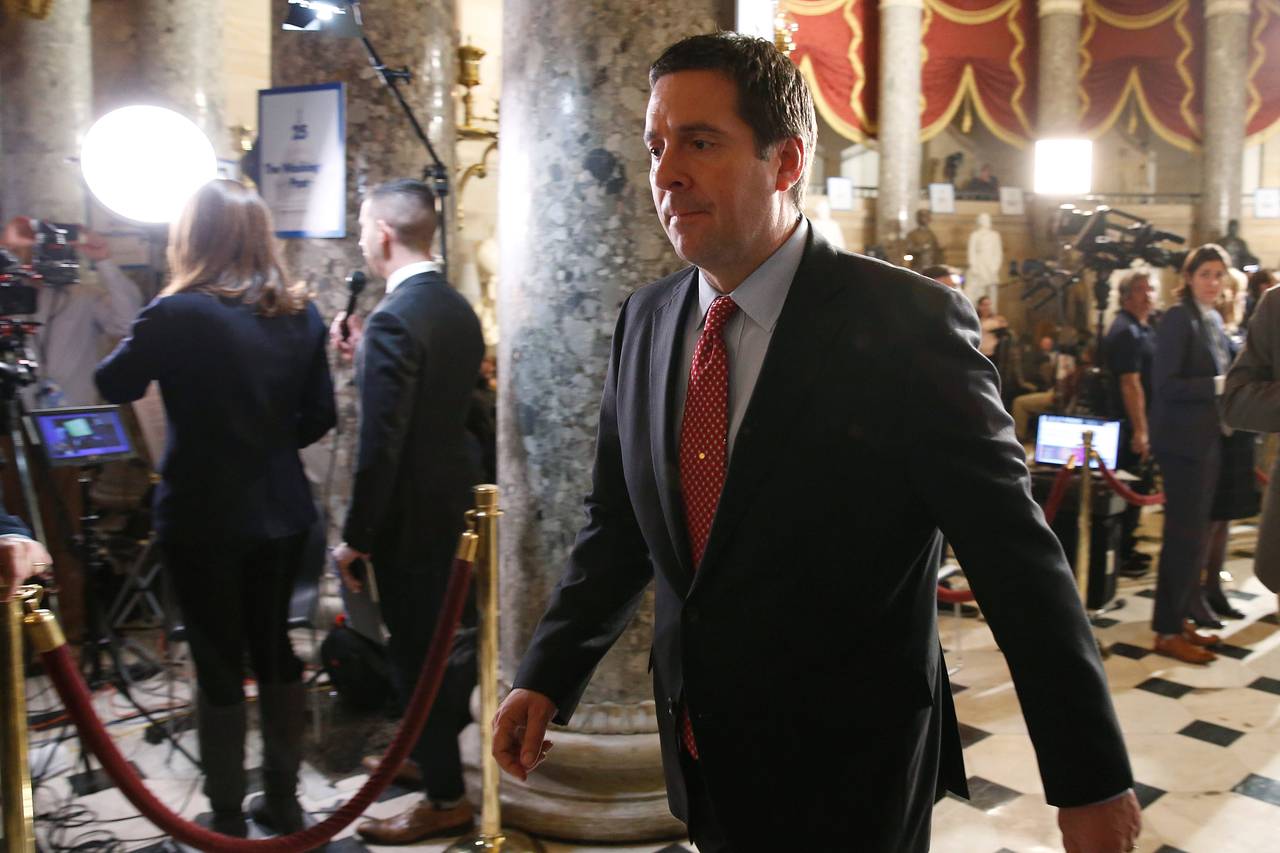
Rep. Devin Nunes
first a comment: How does one explain Republicans, who had excoriated Hillary Clinton for negligent exposure of classified information on a private server, deliberately releasing classified information in an action that both the FBI and Department of Justice found “reckless”?
The memo contends that “material and relevant information was omitted” from an application to the FISA court (the secret court set up by the Foreign Intelligence Surveillance Act of 2001, as amended) to monitor Trump campaign associate Carter Page.
failings
The memo says the application failed to disclose that the document referred to as the “dossier”, compiled by former British MI6 agent Christopher Steele, was the product of “opposition research” aimed at Trump and paid for by the Clinton campaign. (There was no mention in the memo that Republicans opposed to Trump had first funded Steele’s research).
The Nunes memo in turn fails to mention that, to demonstrate probable cause, FISA applications are voluminous, relying on considerably more than a single document and believed to run to 50 to 100 pages typically. As James Comey put it when FBI director, they were often thicker than his wrists. Other than the mention that the dossier is an “essential part” of the application, the memo pretty much leaves the reader thinking the dossier was pretty much it.
That comports with the pre-memo Republican attempt to make what they always call the “unverified” dossier the trigger that set off the Russian probe. To successfully persuade us it was the genesis would make the Russian investigation a politically driven contrivance whose conclusions should be ignored.
The memo then cites now-former FBI Deputy Director Andrew McCabe testifying to the committee in December that “no surveillance warrant would have been sought…without the Steele dossier information”. Does that mean the FBI had too little else to rely on, or that the dossier was of course included as something that shouldn’t be left out? Or neither. Two sources have told The Daily Beast that McCabe said no such thing.
show cause
If the Nunes memo started out as an attempt to prove that the dossier triggered the FBI probe, that was recently undercut by the discovery that another Trump associate, George Papadopoulos, in London in May 2016 during an evening of “heavy drinking”,
let slip to Australia’s top diplomat to the UK that Moscow had thousands of emails that would embarrass Hillary
Former Trump campaign aide George Papadopoulos on a street in London.
He has pleaded guilty to lying to the FBI about his Kremlin-related contacts.
Clinton. The diplomat notified the FBI and their investigation was underway months before Christopher Steele came upon information in his explorations that caused him, too, to notify the FBI. The Nunes memo makes grudging admission that this was the true signal that launched the FBI investigation, but immediately points out that the inquest was begun by Pete Strzok, the FBI agent subsequently demoted for exchanging anti-Trump emails with his mistress.
sin of omission
The first submission to the FISA court was on October 21, 2016, a fortnight before the election. Some members of Congress may have learned of it by then, but it didn’t reach the media until December. (These pages covered it before most did.) So it would have been unlikely for FISA court members to have known of the dossier and a material omission not to have spelled out its provenance — at least that is the reasonable claim of the memo. Committee Democrats claim that the memo is incomplete, inaccurate and misleading.
FISA warrants expire after 90 days. Renewal requires a “separate finding of probable cause” each time, as the memo recognizes. If the provenance of the dossier — that its research was paid for by the DNC and the Clinton campaign — was not known by the FISA court judges at the time of the first application, it certainly would have been known by them at the time of each of the renewals which spaned a year. It was all over the media. The memo sweeps in all the renewals as if they are as guilty as the original’s sin, yet the judges evidently didn’t object. The court kept giving the go ahead.
The memo lists a number of people beginning with FBI Director James Comey who signed off on a total of four submissions. The most recent of these was by Deputy Attorney General Rod Rosenstein. The president said about the memo after he cleared it:
“I think it’s terrible, you want to know,…I think it’s a disgrace what’s happening in our country and when you look at that and see that and so many other things what’s going on then a lot of people should be ashamed of themselves and much worse than that.”
A reporter then asked the president whether he was more likely to fire Rosenstein, whether he had confidence in him. Trump replied, “You figure that one out”. Here’s our calculus:
Attorney General Jeff Sessions recusing himself from the Russia inquiry — he was compromised for having himself met with Russians — has never ceased to infuriate the president. He had put Sessions at the head of the Justice Department to protect him.
In March he fumed “Where’s my Roy Cohn”, referring to the viperous sidekick lawyer at Senator Joe McCarthy’s side whom Trump later engaged as his own counsel.
The recusal put Rosenstein in charge of Robert Mueller and his investigation, the only one with the power to constrict the investigation or fire the special counsel. Trump had highly inappropriately asked Rosenstein if he was “on my team”, to which the probably flustered deputy lamely answered, “we’re all on your team” (when he should have answered that the Justice Department is on no one’s team).
But, once again, as with Comey and others, the lack of a one-to-one personal loyalty pledge puts Rosenstein in Trump’s crosshairs. The president makes it obvious that he is searching for a pretext to fire the DAG so as to replace him with someone more malleable, someone who will go as far as firing Mueller. Now Trump can point to the memo as giving him that pretext: After all, wasn’t Rosenstein party to what the memo claims is a fraudulent surveillance warrant? He has set extreme Republicans to howling that Rosenstein must get the axe.
person of interest
There was ample reason for surveillance of Carter Page. He had appeared on the FBI’s radar in 2013 when he showed up in wiretaps as being courted by a pair of Russian spies and a Russian banker in New York. He was on suspiciously good terms with Russia which led the FBI to wonder if he had become a Russian agent. In 1998 he had worked for Ian Bremer’s Eurasia Group but his vehemently pro-Kremlin views made him not a good fit. He was even outspokenly against Obama and Clinton, which may have been what made him attractive to Trump. The campaign approved a trip to Moscow in 2016. The Steele dossier reported that he was straightaway accorded secret meetings at the Kremlin with top Russian officials, one being the second most powerful among them and a former KGB agent. “Collusion”, a recent book by Guardian reporter Luke Harding says Page was offered a deal worth millions if he could get the Trump administration to reverse Obama’ sanctions against Russia. Harding’s stunning profile of the curious Mr. Page is online at Politico. If the FBI shaded their application, amidst a swirl of peculiar Russian contacts by the Trump campaign and admiring comments about Putin by Trump himself, perhaps their worry was that we couldn’t afford the FISA court denying surveillance.
nunes at it again
Trump found his Roy Cohn in Devin Nunes, a representative from California. There are intimations that the White House even helped Nunes with the memo. When Rep. Mike Quigley (D-IL) asked Nunes this question, the chairman said “As far as I know, no”, but turned away from answering a follow-up.
It was hardly an untoward question. There was a precedent. In March, Nunes was caught out in a clumsy plot he and the president had hatched whereby he rushed to the White House to tell Trump he had discovered documents that would prove — although they did nothing of the sort — that former President Obama “wiretapped” Trump Tower during the transition. “The President needs to know that these intelligence reports are out there and I have a duty to tell him that”. The buffoonery meant to exonerate Trump’s tweet accusing Obama fell apart when Nunes revealed he had got the documents from the White House itself. You can read the full comedy here.
“It’s not a place we wanted to go, but it’s where we had to go”, is how Nunes explained his new crusade. He and the Republicans on his committee voted to forbid release of the Democratic response prepared by the committee’s highest ranking Democrat, California’s Adam Schiff. There was to be no rebuttal to a text crafted to serve the personal concerns of the president. Nunes even refused the request of the Senate Intelligence Committee’s Republican chairman Richard Burr to see the memo. Director Christopher Wray of the accused FBI said he was “provided a limited opportunity to review this memo” only the day before its release, prompting him to express “grave concern about material omissions of fact that fundamentally impact the memo’s accuracy”.
Is the chairman of the House Intelligence Committee in fact working for the White House? California Democratic and committee member Eric Swalwell doesn’t pull punches: “He never left the transition team, just by his actions. He continues to work hand-in-hand in trying to protect the president”. Schiff puts it more delicately: “The interest of the committee would be far better off with a different chair”.
the speaker, too?
Paul Ryan was all in for Nunes, claiming that the memo is not an indictment of the FBI, or of the Department of Justice, which of course it is. Why else broadcast this misstep in one FISA application (generously assuming that Nunes’ document is truthful, despite his record) to the American people, implanting in them the view that the justice system is biased and corrupt, rather than handle this singular instance procedurally within the government? Ryan, who as Speaker, could have throttled Nunes back, instead preached that against…
“…individuals who have abused that power, it is our job in Congress to shed light on that and bring transparency and accountability to the process. I say let all of it out…the more transparency the better. That’s why we think sunshine, transparency and accountability is [sic] the correct antidote for this.”
Except for letting out the Democrat’s rebuttal, that is.
breach of trust
The FBI “slow-walked and stonewalled when it came to producing information that the committee was entitled to in the exercise of its oversight” role said one of George W. Bush’s attorneys general, Michael Mukasey. He should know, however, that data about pending investigations are not turned over to Congress as part of its oversight role. And in this case, it was still more extraordinary that a member of the leaky House got access to a secret FISA application.
Look what then happened. The understanding that the information would be zealously guarded, that secrets were shared in trust, was right off broken by Devin Nunes and the Republicans who backed him. The information he was looking for was put to immediate use against the agency that supplied it and finds itself spread around the globe. Jeffery Smith, former legal counsel to the CIA, said, “the manner in which this has been done undermines the effectiveness of oversight…our enemies look at this with delight”. “The latest attacks on the FBI and Department of Justice serve no American interests — no party’s, no president’s, only Putin’s”, Sen. John McCain (R-AZ) said in a statement after the release of the memo. Schiff said:
It’s a violation of the whole compact between the committee and the intelligence community. That compact provides you share with us your closest-held secrets, we’ll keep them protected, that we’ll protect your sources and methods and we will never abuse this for partisan purposes. That’s been broken here, and I think the Speaker [Ryan] is a complicit party in the breaking of that compact”.
Swalwell says the committee has poisoned the well. “FBI and Justice will never again turn over material of an ongoing investigation to any congressional oversight committee”. Ken Dilanian, NBC News national security reporter, quotes his sources in Congress on both sides of the aisle saying that this threatens to “blow up 40 years of congressional oversight of intelligence”.
eve of destruction
Nunes and the Republicans on the committee have gone beyond discreet oversight to instead work to broadly destroy the public perception of the FBI and the Justice Department, all in the service of protecting Donald Trump. Former CIA director Michael Hayden:
“It is the part of intelligence that most needs to keep politics out of the process. And here we have now an injection of hyper partisanship into that process, and I just fear the great damage that will be done to institutions including oversight committees in the Congress, including the presidency, and, of course, obviously, the FBI.”
Now that it’s out there for appraisal, are Republicans taking a balanced view of a memo that reports an important but single omission in an application to keep an eye on a decidedly suspicious person?
Apparently not. In the aftermath, the Washington Post reports from a Republican conclave at the Greenbrier resort in White Sulphur Springs, West Virginia, that many of the “rank-and-file” are in the hunt for the scalps of Rosenstein and Mueller. “America’s free and fair elections were being threatened from within”, said Rep. Matt Gaetz (R-FL) . Rosenstein should be prosecuted as a traitor, said another.
Trump, on Superbowl weekend, tweeted “This memo totally vindicates ‘Trump’ in probe… Their [sic] was no Collusion and there was no Obstruction”. That absolution could be found nowhere in the memo, but the authoritarian vortex spins on.
Feb 5 2018 | Posted in
Politics |
Read More »

















